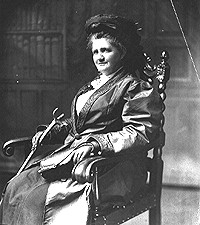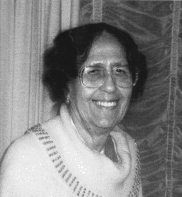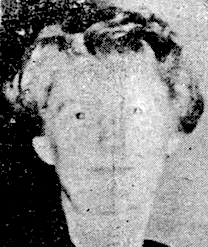Related Research Articles

Frances Scott "Scottie" Fitzgerald was an American writer and journalist and the only child of novelist F. Scott Fitzgerald and Zelda Sayre Fitzgerald. She worked for The Washington Post, The New Yorker, The Northern Virginia Sun, and others, and was a prominent member of the Democratic Party. She was inducted into the Alabama Women's Hall of Fame in 1992.

The University of Montevallo is a public university in Montevallo, Alabama. Founded on October 12, 1896, the university is Alabama's only public liberal arts college and a member of the Council of Public Liberal Arts Colleges. The University of Montevallo Historic District was established in 1979 and included 16 buildings on campus. It was expanded in 1990 to include 75 buildings total. It is located in a rural location in central Alabama.

John Roy Steelman was the first person to serve as "The Assistant to the President of the United States", in the administration of President Harry S. Truman from 1946 to 1953. The office later became the White House Chief of Staff.

Julia Strudwick Tutwiler was an advocate for education and prison reform in Alabama. She served as co-principal of the Livingston Female Academy, and then the first woman president of Livingston Normal College. She was inducted into the Alabama Women's Hall of Fame in 1971.
Adelaide Hawley Cumming was an American vaudeville performer, radio host, television star and living trademark "Betty Crocker", and in later years, a teacher.
Olive "Polly" Matthews Stone was a sociologist whose interests focused on human welfare, race relations, and southern American farmers. Throughout her life, she was actively involved in several Marxist reading groups and financially contributed to union organizing in the black belt region.

Caroline Stewart Bond Day was an American physical anthropologist, author, and educator. She was one of the first African-Americans to receive a degree in anthropology.
Precious Jewel Freeman Graham was an educator, social worker, and attorney. She was professor emeritus of social work and legal studies at Antioch College, Yellow Springs, Ohio. She was the second black woman to serve as president of the World YWCA. She was named to the Ohio Women's Hall of Fame in 2008.

The Southern States Conference (SSC) was an affiliate of the National Association of Intercollegiate Athletics that included member institutions in the U.S. states of Alabama, Georgia, Mississippi, and Florida. The league existed from 1938 to 1997.

Annie Lola Price (1903–1972) was an Alabama, United States, lawyer, who was one of the first women to become licensed in the state. She was the first woman to serve as a legal advisor for a governor in Alabama and the first woman to serve on the state's appellate court. Between 1962 and 1972, she was the presiding judge of the Alabama Court of Criminal Appeals. Price was inducted into the Alabama Women's Hall of Fame in 1976 and into the Alabama Lawyers’ Hall of Fame in 2004.
Marion Walker Spidle (1897–1983) was an American educator. She was inducted into the Alabama Women's Hall of Fame.
Edwina Donnelly Mitchell (1894–1968) was the Superintendent (warden) of Julia Tutwiler Prison for Women located in Wetumpka, Alabama.

Evelyn Daniel Anderson was an American educator and advocate for physically disabled people.
Doris Marie Bender was an Alabama social worker. Her programs to help the elderly and disabled adults, developed in Mobile County, became models for later state-wide efforts to protect these groups of people. Bender was inducted into the Alabama Women's Hall of Fame in 1994.

Idella Jones Childs was an American educator, historian and civil rights activist. Childs worked as a teacher for 35 years in Perry County in Alabama. During the civil rights movement, her home was a meeting place for activists. She was the mother of Jean Childs Young, who later married Andrew Young who went on to become mayor of Atlanta. Childs worked as historian, helping to put two places in Alabama on the National Register of Historic Places. She also became the first black woman to sit on the city council in Marion. Childs was inducted into the Alabama Women's Hall of Fame in 2002. An award named after Childs is given out from the Alabama Historical Commission for the recognition of those who have contributed to the preservation of historic African American places.
Dr. Hallie Farmer (1881–1960) was an American college professor, political activist, and historian. Farmer was also heavily involved in the women’s political rights movement and frequently wrote letters to her representatives in Alabama if she was unpleased by public affairs. Farmer also advocated for prison reform and against voting discrimination. Farmer’s educational background is extensive. She served as the head of the political science and history department at Alabama College for Women during the period of 1927-49 and from 1949-1956, as the Dean of the Social Sciences Department.
Ruth Robertson Berrey was an American pediatrician, educator, and a medical missionary to Nigeria. Berrey was active within the Alabama Pediatric Society and became a fellow in the American Academy of Pediatrics. As a medical missionary, she helped children in Nigeria and helped reduce leprosy in the population. As a public health officer in four Alabama counties, she conducted clinics for the detection of tuberculosis, cancer, diabetes, sickle cell anemia, and other diseases.

Delphine Feminear Thomas was an American educator and civic leader in Auburn, Alabama.

Minnie Steckel was an American teacher, psychologist, clubwoman, and an activist involved in the women's poll tax repeal movement. Steckel began her career as a school teacher and worked her way up to school principal, superintendent and school psychologist, earning her bachelor's, master's and PhD degrees. From 1932 until her death in 1952, she was the dean of women and counselor at Alabama College. She served as president of the local Montevallo chapter of the American Association of University Women (AAUW) from 1937 to 1939, as president of the state chapter of the Business and Professional Women's Foundation and treasurer of the state chapter of the AAUW in 1951.

Amy Hewes was an American economist, "a pioneer in introducing the minimum wage to the United States", who taught at Mount Holyoke College from 1905 to 1943.
References
- ↑ Merrill, Frederick Augustus (1915). The Educational Monthly. State Normal School. p. 184.
- ↑ Hultquist, Clark; Heatherly, Carey (2011-05-23). Montevallo. Arcadia Publishing. ISBN 9781439641705.
- ↑ Surles, Flora B. (18 November 1928). "Myrtle Brooke Scholarship Fund Established at Alabama College". The Montgomery Advertiser. Retrieved 2018-12-20– via Newspapers.com.
- ↑ "Miss Myrtle Brooke, who has been". The Selma Times-Journal. 5 September 1920. Retrieved 2018-12-20– via Newspapers.com.
- ↑ "UM Social Work Program Celebrates 90th Anniversary This Year in Coordination with 'Advocacy Day'". University of Montevallo. September 28, 2015. Retrieved December 14, 2018.
- ↑ Newspaper Scrapbook 1928, p. 4.
- 1 2 "Myrtle Brooke". Alabama Women's Hall of Fame. Archived from the original on 28 February 2018. Retrieved 20 December 2018.
- ↑ Newspaper Scrapbook 1928, p. 107.
- ↑ Mental Health. Vol. 22. 1938. p. 512.
- ↑ "Degrees Conferred for Women's Service". The Alabamian. Vol. 14, no. 1. 25 August 1936. p. 2. Retrieved 20 December 2018– via Internet Archive.
- ↑ Intellect, Volume 67. 1948. p. 186. Retrieved 2 December 2018.
- ↑ "Miss Myrtle Brooke Passes in Montevallo". The Montgomery Advertiser. 31 January 1948. Retrieved 2018-12-20– via Newspapers.com.
Sources
- Newspaper Scrapbook 1928-1929. Shelby County: Alabama College. 1928 – via Internet Archive.